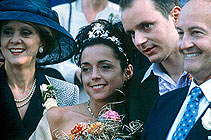|
|
|
|
Beautiful
People
|
 |
|
Beautiful People begins with a flurry of disconnected scenes that seem to promise two fairly unappealing prospects. The first is yet another movie like Magnolia (1999) or Wonderland (2000) in the currently overworked Short Cuts (1993) mode, following the movements of a group of disparate people in a circumscribed urban location. The second prospect relates to the generally downbeat or depressing content of the opening scenes – a culmination of that British miserabilism (as Pauline Kael dubbed it) we know too well from the work of Ken Loach and Mike Leigh. A Serb (Dado Jehan) and a Croat (Faruk Pruti) – two unnamed emblems of a national conflict – recognise each other on a bus and immediately start fighting. An upper class family, the Thorntons, engage in vacuous small talk – a caricatural comedy of manners that makes Monty Python skits seem subtle in retrospect. A gang of racist thugs roams the streets, laying into anyone who seems (in a chilling forecast of Australia's race violence in 2005) different in any way whatsoever. Beautiful People thus starts out loose and messy – and it never loses that feel. But, about ten minutes in, more unusual elements and tones begin to emerge. A street chase involving various characters takes on the frenzy of burlesque comedy. Slightly surreal details and incidents pop up. The film, aided by an uninhibited musical score, starts to more closely resemble Kusturica's Black Cat White Cat (1998) than either My Name is Joe (1998) or Naked (1993). This is a tremendously original, diverting and surprising film to emerge from Britain. Jasmin Dizdar, directing his debut feature, takes a standard "multicultural" premise – to study how a patch of London is effected by calamitous events far away in Bosnia – and spins from that an energetic, bizarre, life-loving fantasy. The wayward looseness of the film sets it apart from more mechanically structured, predictable films like Magnolia and Wonderland. Those movies, through their very form, imply a grimly determinist view of social and personal decline – relieved, usually, only by a desperate insertion of ersatz hope or redemption at the finale (the American Beauty [1999] syndrome). You can almost never guess what is coming next in Beautiful People, and this generates its greatest delights. Certain motifs create echoes from one story thread or character to the next – like the notion of a sudden or violent accident that brings strangers together and creates unforeseen consequences – but they never bind the film into a rigid structure. The frustrating aspect of films that offer a determinist view of contemporary, urban ills is that they reduce their characters to sad, little insects, fixed into their place on the merciless chessboard of class, gender and race relations. Such characters may crack up or lash out, but they are rarely free to play, improvise or truly resist their social conditioning. Beautiful People offers a radically different and altogether more optimistic picture. Here, people can take crazy steps, alter their personality and transform their social status in virtually an instant. Dizdar has a keen eye for the abiding problems of urban alienation, melancholy and loneliness, but he keeps inventing ways for his characters to turn around their destiny. True to a certain element in the Eastern European sensibility, Dizdar is unafraid to celebrate the politically incorrect notion that social conflict is eternal and, in some senses, enjoyable – that it is an inescapable part of human nature. This attitude does not prevent him from making pointed political observations, or being able to weigh the sometimes tragic outcomes of social conflict against its everyday, colourful rowdiness. Much of Beautiful People is frankly implausible and unreal. Why would a hospital keep that Serb and that Croat in the same room when they keep trying to kill each other? Why would an ex-soldier from Bosnia, Pero (Edin Dzandzanovic), be so eager to confess his shady past to the assembled British upper crust at his wedding? And would a street thug really behave the way Griffin (Danny Nussbaum) does if suddenly dropped into the middle of a war zone? The rampant, deliberate improbability of the film is its ace card – and its blow against much British cinema. Dizdar refuses the kind of naturalistic drama which implies that people never change and that social conditions basically only ever worsen. This film, amidst the misery and violence of everyday life, dares to imagine the impossible – and finds in that flight of fancy a fierce joy and inspiration. © Adrian Martin May 2000 |
![]()